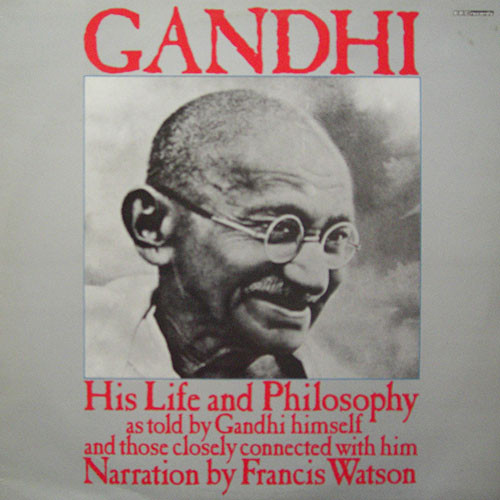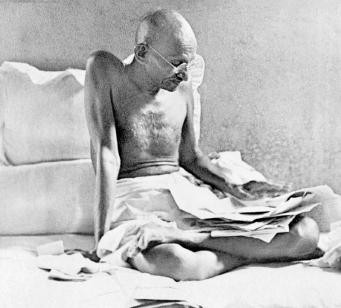
Mahatma Gandhi
His Life And Philosophy
Album UK 1983 on BBC label
Spoken Word (Speech)
His Life and Philosophy as told by Gandhi himself and those closely connected with him. Narration by Francis Watson. Recordings from the BBC Sound Archives of Mahatma Gandhi and those connected with his remarkable life and work. Narration written and spoken by Francis Watson. Includes the voices of Mahatma Gandhi, Jawaharlal Nehru, Dr. Zakir Husain, The 1st Earl of Halifax (Lord Irwin), Earl Mountbatten of Burma, Sir Robert Broomfield, Chakravarti Rajagopalachari, Rajkumari Amrit Kaur, Dr. Gilbert Murray, O.M., Acharya J.B. Kripalani , Raja Hutheesingh, H. S. L. Polak, Pyarelal Nayar, Dr. Sushila Nayar, Dr. B. R. Ambedkar, Mirabehn (Mirabehn), Reginald Reynolds, Maurice Frydman, G. D. Birla, Shankerlal Banker, P. L. O'T Quinn, H. N. Brailsford, Sudhir Datta, Muriel Lester, Brijkrishna Chandiwala, K. Shridharani, Robert Stimson, J. R. Glorney Bolton and Sudhir Ghosh. Actuality recordings include the moment of Independence for India on August 15th, 1947 with crowds shouting “Mahatma Gandhi ki jay”; A message from Gandhi to the West just after Independence; Three excerpts from Gandhi speaking in English at the Asian Relations Conference in New Delhi, April 2nd, 1947; a bomb going off while Gandhi is speaking in his own language at his prayer meeting; Gandhi speaking about the people of East London where he was staying in 1931. Music is traditional Indian (BBC Copyright) and includes a recording of a beggar in a train playing a Bulbultarang (keyboard zither). The life of Mohandas Karamchand Gandhi — Mahatma Gandhi to the multitude — was regarded by himself as one of continual experiment. His formative years in South Africa gave him a personal direction, and the chance to test his principles and his techniques of non-violence with spectacular — if temporary — success against the specific injustices ofdiscriminatory legislation. His subsequent revolutionary role in India, beginning in the same way with a protest against particular laws (enacted as a matter of emergency in the aftermath of World War I) carried him to the leadership of a movement, which already existed, for a political independence which was already envisaged. The things that mattered deeply to Gandhi were the means by which independence should be attained, and the sort of India that it should produce. But right up to the political goal, and beyond it to the assassination that ended his long life, the process was still experimental. One of his favourite English hymns was Lead, Kindly Light, and its most-quoted line was 'One step enough for me: He called his vivid fragment of autobiography Experiments with Truth. And his wide-ranging political and social activity had spiritual fulfilment as its goal rather than its origin. Throughout his extraordinary career, while he felt himself to be at every moment on trial by God, Gandhi exposed himself, his ideas and his actions to the tribunal of his fellow-men. Entirely human and devastatingly charming in his personal relations, he was on trial by his closest colleagues as well as by his political rivals, by the British opponents whom he strove to convince rather than to defeat, and in the widening court of world opinion. "I have not known any man of that greatness;' says the President of India, Dr. Zakir Husain, in his recording, "who could tolerate opposition as much as he did, and who welcomed discussion as much as he did." With this as a leitmotiv, and with more than 25 hours of recorded speech about Gandhi from which to select, the intention has been to form a pattern of intimate and informal testimony, presenting Gandhi as eye-witnesses saw him at some of the high-points of his astonishing career: the early triumphs in South Africa; the almost legendary 'Great Trial' in Ahmedabad in 1922 — after which, though Gandhi was imprisoned half-a-dozen times by the authorities in India, he was never again produced in court; the Salt March that opened his second mass- campaign in 1930 and the yet more historic meetings with Lord Irwin (afterwards Lord Halifax) that brought it to an end with what Winston Churchill called 'the nauseating spectacle of a seditious fakir.walking half naked up the steps of the Viceroy's palace, there to parley and negotiate with the representative of the King- Emperor'; the visit to England in 1931; the "Epic Fast" for the Untouchables; the "Quit India" demand during World War II and the last confinement that followed it; the lonely struggle against spreading violence that some have called Gandhi's finest hour; and the final sacrifice, not unexpected by its victim, murdered by one of his own people at his Delhi prayer-meeting. Francis Watson
Musicians
 | Mahatma Gandhi , 1869-1948 IN album by |
 | Francis Watson narrator |
Producers
| Sylvia Cartner producer |
Album Tracks
| No | Title | Artist | Composer | Duration |
|---|---|---|---|---|
| 1 | Untitled | Mahatma Gandhi | ||
| 2 | Untitled | Mahatma Gandhi |
